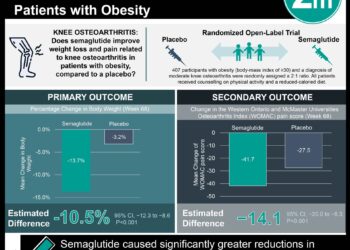Lorcaserin does not increase rate of cardiovascular events in overweight or obese patients
1. At a median follow-up of 3.3 years, rates of composite cardiovascular events in at-risk overweight or obese patients treated with lorcaserin were not significantly worse than for placebo treated patients.
2. Lorcaserin treated patients had significantly greater weight loss at 1 year compared to placebo treated patients.
Evidence Rating Level: 1 (Excellent)
Study Rundown: Rates of obesity have drastically increased around the world in recent decades. Associated conditions which cause significant morbidity and mortality such as diabetes and stroke have risen alongside obesity. In addition to dietary and activity lifestyle modifications, pharmaceutical treatments could serve as an important treatment for overweight and obese patients. The 5-hydroxy-tryptamine 2C serotonin receptor agonist lorcaserin alters appetite and is of interest for treatment of overweight and obese patients. The CAMELLIA–TIMI 61 (Cardiovascular and Metabolic Effects of Lorcaserin in Overweight and Obese Patients–Thrombolysis in Myocardial Infarction 61) trial investigated long-term cardiovascular and metabolic safety of lorcaserin in overweight patients with cardiovascular disease. The primary outcome of major cardiovascular events at a median follow-up of 3.3 years showed patients randomized to lorcaserin had similar outcomes as placebo treated patients. Weight loss of greater than 5% occurred in significantly more lorcaserin patients at 1 year.
Strengths of this study include its randomized design, detailed adverse event reporting, and inclusion of patients with multiple cardiac risk factors. Limitations include access to diet and exercise support during the study which is not generalizable to most patients, absent description of proportion of muscular or fat changes during weight loss, and absent reporting of weight loss comparisons at 3.3 years of follow-up. Overall, this study provides strong support to the cardiovascular safety of an important adjuvant therapy for weight loss in overweight or obese patients.
Click to read the study in NEJM
Relevant Reading: Multicenter, placebo-controlled trial of lorcaserin for weight management
In-Depth [randomized controlled trial]: Patients were recruited and randomized to study groups from 2014 to 2015. Eligible patients had a body mass index (BMI) of at least 27 and had one or more cardiovascular risk factors. Patients were treated with lorcaserin (n=6000) or placebo (n=6000) and followed for a median of 3.3 years. Over half of all patients studied had diabetes, hypertension, hyperlipidemia, or atherosclerotic cardiovascular disease. Discontinuation of patients in the study occurred at approximately 12% per year in both study groups. At 1 year, the mean change in weight from baseline was -4.2kg in the lorcaserin group and -1.4kg in the placebo group (P<0.001). Weight loss of at least 5% or 10% at 1 year occurred in a greater proportion of treated patients compared to placebo patients (P<0.001 for both comparisons). The primary outcome of major cardiovascular events occurred in 2.0% of patients per year in the treatment group and 2.1% of patients per year in the placebo group (hazard ratio [HR], 0.99; 95% confidence interval [CI], 0.85 to 1.14; P<0.001 for noninferiority). Incidence of serious adverse events was similar between both groups. Of patients who had both baseline and 1-year cardiac echocardiograms performed, worsening valvulopathy occurred in 1.8% and 1.3% of treated and placebo patients, respectively (P=0.24).
Image: PD
©2018 2 Minute Medicine, Inc. All rights reserved. No works may be reproduced without expressed written consent from 2 Minute Medicine, Inc. Inquire about licensing here. No article should be construed as medical advice and is not intended as such by the authors or by 2 Minute Medicine, Inc.






